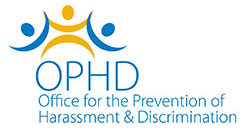Overview for Faculty
We have provided links to a wide variety of policies and procedures that faculty may find helpful. There are nondiscrimination policies that outline the university’s commitment to nondiscrimination and list the protected categories, such as race, sex, gender, religion, national origin, etc. For summaries of definitions of unlawful harassment and discrimination, please see the FAQ. There are also procedures OPHD uses to help resolve and investigate different types of complaints. For your convenience, we included links to the Principles of Community and to other relevant policies and procedures, such as the Faculty Code of Conduct. Represented academic appointees, such as postdocs, may utilize the grievance process under their collective bargaining agreement or may use OPHD’s process as the first step of the grievance process.
A note on Responsible Employees:
All supervisory employees must report student incidents of unlawful discrimination and harassment to OPHD. Certain nonsupervisory employees may also have a reporting obligation if deemed a “responsible employee.” In all cases, nonsupervisory employees are strongly encouraged to report bias-related incidents to OPHD or to a supervisor.
Policies and Procedures Related to Nondiscrimination
UC Nondiscrimination Policy PPSM-12
UC Policy on Anti-Discrimination (Effective January 2026) (Responsible Employee FAQs)
UC Anti-Discrimination Investigation and Adjudication Framework for Senate and Non-Senate Faculty
UC San Diego Procedures for Discrimination and Harassment Complaint Resolution PPM 200-23
UC San Diego Academic Personnel Affirmative Action Program Policy PPM 230-6
Policies and Procedures Related to Sexual Violence and Sexual Harassment
Chancellor's Reaffirmation of UC San Diego's Policy on Sexual Violence and Sexual Harassment
UC Policy on Sexual Violence and Sexual Harassment (Effective January 2026)
- UC Politica de Violencia Sexual y Acoso Sexual
- 加州大學 – SHSV 政策
- Sekswal na Kaharasan at Sekswal na Panliligalig
UC San Diego Policy for Reporting and Responding to Sexual Violence and Sexual Harassment PPM 200-19
UC Investigation and Adjudication Framework for Senate and Non-Senate Faculty
Written Notice of Reporting Options/ Rights & Resources for UC San Diego Employees
Additional Policies
UC San Diego Principles of Community
UC Policy on Gender Recognition and Lived Name
Statement Regarding Discrimination and Harassment, UC San Diego General Catalog
UC Faculty Code of Conduct APM-015
UC San Diego Policy on Conflicts of Interest Arising Out of Consensual Relationships PPM 200-11
UC San Diego Policy on Romantic, Dating, or Sexual Relationships Between Academic Appointees and Undergraduate Students
You can make a complaint of unlawful harassment or discrimination — or simply make an appointment to find out more information — by contacting OPHD.
- (858) 534-8298
- ophd@ucsd.edu
You can also make a complaint online by using the Report Bias page.
If you want to make a complaint, OPHD can assist you either by
- Helping to resolve the matter informally.
- Doing a formal investigation. OPHD investigates by interviewing the parties involved, including witnesses, and evaluates available evidence. OPHD then determines whether the evidence supports a finding that university policy has been violated and issues a written report with the investigative finding. The university administrator responsible for determining an appropriate action or discipline receives the report. The proper administrator may be a Division Chief, Department Chair, Dean, Vice Chancellor or other administrator, depending on the allegations and finding.
There is no prescribed sequence — choosing a formal or informal option — so choosing one option first does not prevent a complainant from choosing a different option for resolution later on.

